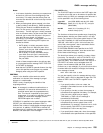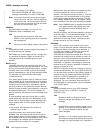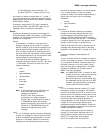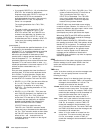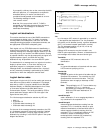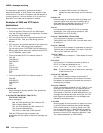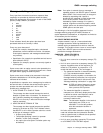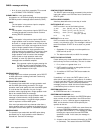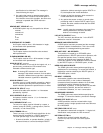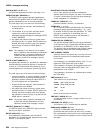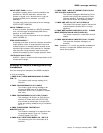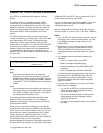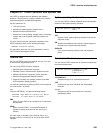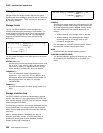CMSG—message switching
specification to be eliminated. The message is
routed following this input.
3. Any option that causes a return to normal option
processing mode. If another ERRTERM option is
not entered to correct this condition, the same error
message is repeated after SEND has been
reentered.
HEADNG NOT YES/NO AT xxxx
A HEADING option may only be specified as follows:
HEADING
HEADING=YES
HEADING=NO
H
H=YES
H=NO
ID OPERAND GT 62 CHARS
An ID option must be from 1–62 characters in length,
and enclosed within parentheses.
ID OPERAND MISSING
The ID option requires the identifier to be enclosed
within parentheses.
ID PARAM MISSING OR NO )
The ID option must be from 1–62 characters in length
and enclosed within parentheses.
INVALID LDC AT xxxxxxxx
The LDC mnemonic is not valid for the logical unit, or a
previous entry contained an LDC mnemonic that
indicated a different device type.
Note: A missing LDC mnemonic can cause this
message if the default mnemonic for that station
indicates a different device type than a previously
indicated mnemonic (specified or defaulted).
INVALID OPND AT xxxxx
An option xxxxx is invalid (possibly caused by a keying
error). No data beyond this point was processed. The
status indicators represent the options that are in effect.
INVALID TBL SFX AT xxxxx
A terminal list table suffix must be 1 or 2 characters
preceded by a period.
INVLD OPERATR ID AT xxxxx
An operator identifier must be 1, 2, or 3 characters
preceded by a slash.
INVLD SEPARATOR AT xxxxx
The end of an option must be followed by a space, a
comma (except for SEND), a carriage return (new-line
character), or end of data (EOD).
INVLD TERMINL ID xxxx
There is no entry in the CICS terminal definition for the
terminal identifier specified for a ROUTE destination.
The valid operator reply is one of the following:
1. A terminal identifier, or operator identifier, or both, in
the same format as a normal termid/opid ROUTE
destination (without entering the option ROUTE= or
R=) that replaces the invalid destination.
2. A space as the first character, which causes the
invalid destination to be deleted.
3. Any option that causes a return to normal option
processing mode. If another ROUTE option is not
entered, the same condition exists after the SEND
option is reentered.
Note: 1 and 2 cause the message to be routed if the
resulting destinations are valid; otherwise,
another error message is issued.
LDC NOT 2 CHARS AT xxxxx
The LDC mnemonic that follows the * in the ROUTE
destination must be 2 characters.
MESSAGE HAS BEEN ROUTED
A SEND option has been processed and the message
has been routed to its destinations. This is the normal
completion of a message-switching transaction.
MSG NOT SENT - NO RECEIVER
This condition is caused by an OPCLASS option
specified without a ROUTE option and no operators, with
the specified operator class, or classes, currently
signed-on to terminal types supported by BMS. To
correct this situation, a new destination must be entered
by the ROUTE option, or OPCLASS option, or both.
NEED OPCLASS OR ROUTE
The SEND option was entered without specifying any
destinations for the message. To correct this situation, a
destination must be entered by the ROUTE option, or
OPCLASS option, or both.
NO INPUT - REENTER
A transaction identifier was entered followed by
end-of-data (EOD), or the number of backspace
characters entered caused the deletion of all the data
(including the position following the transaction
identification, if present). If the input does not start with
the transaction identifier, the terminal remains in
conversation. Otherwise, it is not in conversation.
NO MESSAGE PROVIDED
The SEND option was entered without specifying the
message. To correct the situation, provide the message.
NO MSG STRT QUOT AT xxxxx
A MSG parameter must be enclosed within single
quotation marks. A single quotation mark must follow an
M or MESSAGE.
NO TRMID FOR LDC AT xxxxx
The destination started with an asterisk *. A logical unit
identification must precede the LDC mnemonic.
NO TERM LIST TBL-xx
An entry for a terminal list table with suffix xx
(DFHTLTxx) was not found in the CICS system
definition.
Chapter 19. Message switching CMSG 243



